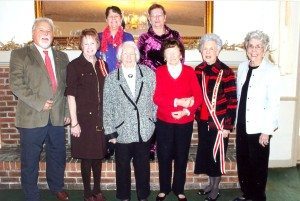
The Ann Harllee Fulmore Chapter of the UDC held their annual Lee-Jackson luncheon on January 9, 2016 at the Twin Lakes Country Club. Upon arrival the members enjoyed a lunch of a delicious chicken salad and fruit plate with a decadent chocolate layer cake for dessert.
Following the meal, Mrs. Mattie Strickland opened the meeting with prayer and recognized our Pee Dee Director Linda Wolfe as a special guest. She reminded everyone of the Pee Dee District Conference which will be held in Myrtle Beach on February 6, 2016, and the registration deadline as January 26th. She reported that Jimmie Rogers’ name was listed in the UDC magazine in memoriam.
Several full-sized blankets which were made by Joyce Diggs were shown. These blankets will be used for raffles and various money-making projects. Thom Thompson, the guest speaker, generously bought the first one.
Mrs. Strickland then introduced Mr. Thompson who is an active member of the Andrew T. Harllee Chapter 2010 of the SCV. She commended him on the good work the chapter members do in keeping the old cemeteries cleaned. She also brought attention to the memorial service which is held every year at the Harllee Cemetery and to the impressive job the chapter members do in holding this event.
Mr. Thompson began his remarks by relating how much hard practice is put in by the Harllee Guard to prepare for these events. He related that the 2010 Chapter had not been able to participate at the last re-enactments held near Florence each year due to the small revenue and the inability to feed the troops. However, the Harllee Guard has been able to raise some revenue with a rifle raffle.
To further enhance our knowledge of South Carolina history, Mr. Thompson chose to bring some interesting facts about the growing of rice in our state. He passed around copies of an 1860 map of the Georgetown District which showed the rice fields along the Pee Dee and Waccamaw Rivers. He informed us that Waccamaw means “happy waters.”
Rice was considered a “gold” crop which had been brought from Africa by slaves. Rice is grown in water with the use of oxen and its cultivation had been mastered by slaves, so slaves and rice became big business. At the beginning of the 20th century, rice was no longer grown in the South Carolina low-country due to inadequate machinery and the gulf-coast markets.
Presently, there is a farm in Darlington County which cultivates a rice crop known as Carolina Gold. As a delightful climax to his program, Mr. Thompson presented Mrs. Strickland with a bag of pleasantly pungent Carolina Gold rice. Even though it is not a major money crop in our state, it was a nice surprise to learn of such a delicacy in our area.
At the close of the program, the meeting was adjourned.


